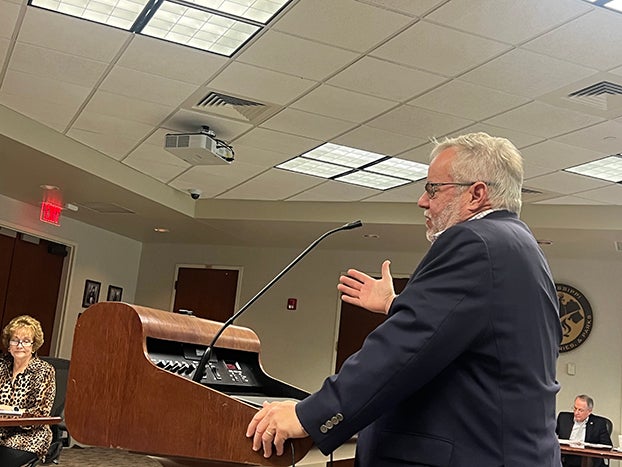Louisiana commissioner visits to encourage cooperation
Published 2:53 pm Thursday, November 16, 2023

- Louisiana Department of Wildlife and Fisheries commissioner Andy Brister introduces himself at the Mississippi Department of Wildlife, Fisheries and Parks commission meeting Thursday. Brister is a native of Lake Providence and spoke to the importance of cooperation due to the states fighting CWD, invasive carp and managing black bears. (Hunter Cloud | The Daily Leader)
|
Getting your Trinity Audio player ready...
|
JACKSON — Mississippi, Arkansas and Louisiana share both a border and experiences in managing wildlife and fisheries and are now working to bridge a gap between the different wildlife agency commissions. The step towards further cooperation is important with Chronic Wasting Disease on the landscape.
Andy Brister, Commissioner for the Louisiana Department of Wildlife and Fisheries, visited the Mississippi Department of Wildlife Fisheries and Parks Commission meeting Thursday in Jackson. He is a native of Lake Providence in East Carroll Parish and in a way serves the northeast region of Louisiana as a commissioner all the way down to Natchez.
Brister said his friend and former MDWFP commissioner Billy Deviney encouraged him to come to a meeting. He said he grew up right across the river from Mississippi and understands the nuances of the region.
“We have been educating people about the islands on the river and the nuances created with the state border. One of the things that is important to me is Chronic Wasting Disease,” Brister said. “It is a common problem and the river is not stopping it. I’m interested in working on that and the management of black bears. One of my pet peeves is invasive carp. I’m interested in talking to people about how to address the carp in our region.”
The area of East Carroll, Tensas and Concordia Parishes and nearby parishes are renowned for the quality of crappie and bass fishing. Brister said they have noticed a decline in quality and thinks the invasive silver carp may be a cause.
“We need a common plan to fight the carp. It is a problem,” he said.
Commissioner Scott Coopwood said he believes it would be beneficial for the commissioners from the Louisiana and Mississippi wildlife agencies to meet each other. MDWFP’s commission went to Arkansas recently to meet the commissioners there.
“We have a lot in common,” Coopwood said. “It would pay great dividends to work together.”






